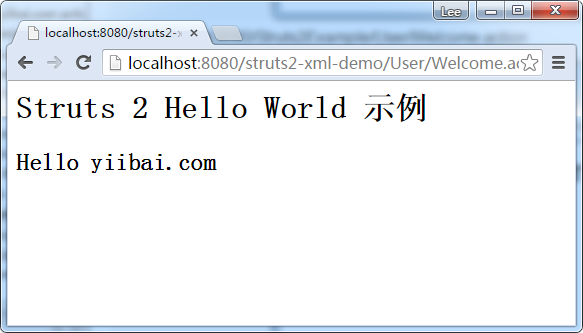Struts 2 hello world (XML版本)
在這個例子中,我們將學習如何在Struts 2中建立一個Hello World例子。
使用以下庫或工具:
- MyEclipse 10
- Struts 2.1
整個工程結構如下圖所示:
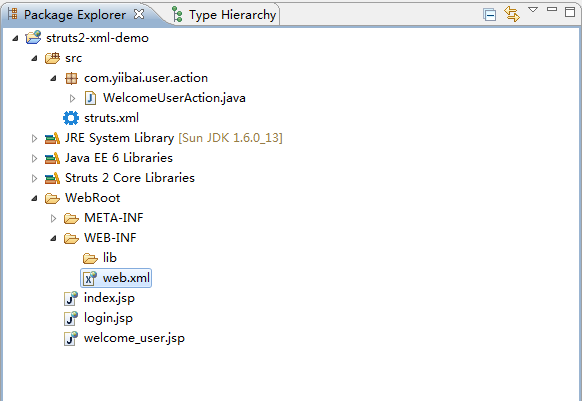
1. 建立一個Web專案工程
啟動開啟 MyEclipse,建立一個Web工程名稱為:struts2-xml-demo,選擇 File -> New -> Web Project ,如下圖所示:
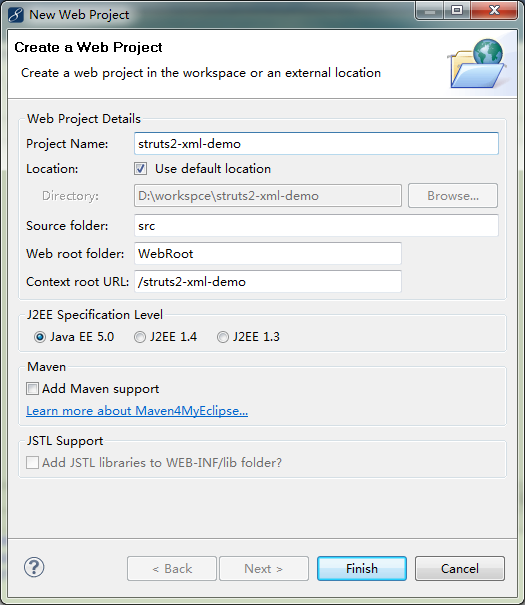
在這個專案上新增 struts2 的支援,右鍵點選 struts2-xml-demo 工程,選擇 MyEclipse -> Add Struts Capabilities,在彈出的對話方塊中選擇 Strut 2.1,如下圖所示:
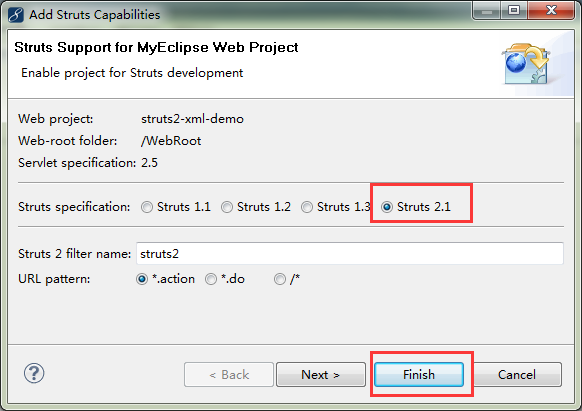
2. JSP檢視檔案
這是一個JSP登入頁面,它使用Struts2標籤來顯示使用者名,密碼輸入框和提交按鈕。
Fie : login.jsp
<%@ page contentType="text/html; charset=UTF-8"%> <%@ taglib prefix="s" uri="/struts-tags"%> <html> <head></head> <body> <h1>Struts 2 Hello World Example</h1> <s:form action="Welcome"> <s:textfield name="username" label="Username" /> <s:password name="password" label="Password" /> <s:submit /> </s:form> </body> </html>
檔案: welcome_user.jsp – 一個JSP檢視用來頁面顯示歡迎資訊給使用者。
<%@ page contentType="text/html; charset=UTF-8"%> <%@ taglib prefix="s" uri="/struts-tags"%> <html> <head></head> <body> <h1>Struts 2 Hello World 範例</h1> <h2> Hello <s:property value="username" /> </h2> </body> </html>
對 Struts1 和 Struts2 有非常相似的UI標籤語法,只是在命名HTML元素,例如,術語有一點不同:
Struts 1
<%@taglib uri="http://struts.apache.org/tags-html" prefix="html"%> <html:form action="Welcome"> <html:text property="username"/> </html:form>
Struts 2
<%@ taglib prefix="s" uri="/struts-tags" %> <s:form action="Welcome"> <s:textfield name="username" label="Username"/> </s:form>
5. 動作,所有的業務邏輯放在這裡
一個簡單的 Struts2 的 Action 類,它裡面宣告的所有業務邏輯。
File : WelcomeUserAction.java
package com.yiibai.user.action;
/**
*
* @author tw511.com
*
*/
public class WelcomeUserAction {
private String username;
public String getUsername() {
return username;
}
public void setUsername(String username) {
this.username = username;
}
// all struts logic here
public String execute() {
return "SUCCESS";
}
}
在Struts2中,Action類實現任何介面或擴充套件任何類不是必需的,但它需要建立一個execute()方法來實現所有的業務邏輯,並返回一個字串值,告訴使用者重定向到哪裡。
您可能會看到一些使用者實現 com.opensymphony.xwork2.Action 類, 但它是完全可選的(不是必須的),因為com.opensymphony.xwork2.Action只是提供一些方便的常數。
5. Struts組態檔案
Strut組態檔案是用來連線所有的東西在一起。 XML檔案名必須是 「struts.xml」。在這個範例中,它位於
File : struts.xml
<?xml version="1.0" encoding="UTF-8" ?> <!DOCTYPE struts PUBLIC "-//Apache Software Foundation//DTD Struts Configuration 2.1//EN" "http://struts.apache.org/dtds/struts-2.1.dtd"> <struts> <package name="user" namespace="/User" extends="struts-default"> <action name="Login"> <result>/login.jsp</result> </action> <action name="Welcome" class="com.yiibai.user.action.WelcomeUserAction"> <result name="SUCCESS">/welcome_user.jsp</result> </action> </package> </struts>
宣告包和包含動作類,動作類是不言自明的,但你仍可能會感興趣下面的新標籤:
1. package name=」user」
就在包名,並不真正去關心它。
2. namespace=」/User」
它用於匹配「/User」URL模式。
實際上,Struts2的名稱空間相當於Struts的1多個功能模組
3. extends=」struts-default」
這意味著該包是擴充套件了struts-default 包元件和攔截器,這是在struts-default.xml中檔案中宣告的,位於struts2-core.jar 檔案的根目錄。
6. web.xml
組態Web應用程式部署描述符(web.xml)檔案Struts2的整合到Web專案。
File web.xml
<?xml version="1.0" encoding="UTF-8"?>
<web-app version="3.0"
xmlns="http://java.sun.com/xml/ns/javaee"
xmlns:xsi="http://www.w3.org/2001/XMLSchema-instance"
xsi:schemaLocation="http://java.sun.com/xml/ns/javaee
http://java.sun.com/xml/ns/javaee/web-app_3_0.xsd">
<display-name></display-name>
<welcome-file-list>
<welcome-file>index.jsp</welcome-file>
</welcome-file-list>
<filter>
<filter-name>struts2</filter-name>
<filter-class>
org.apache.struts2.dispatcher.ng.filter.StrutsPrepareAndExecuteFilter
</filter-class>
</filter>
<filter-mapping>
<filter-name>struts2</filter-name>
<url-pattern>*.action</url-pattern>
</filter-mapping></web-app>
7. 執行測試結果
在Struts2中,可以直接使用.action字尾存取操作類。如下URL:
http://localhost:8080/struts2-xml-demo/User/Login.action
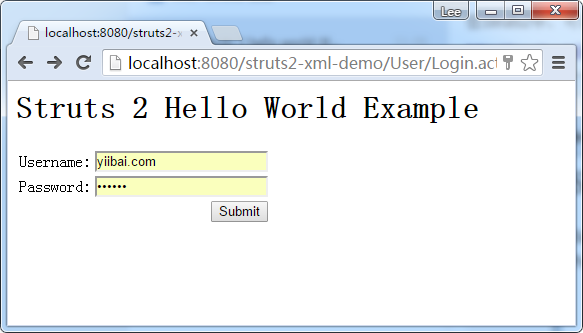
提交後到 http://localhost:8080/Struts2Example/User/Welcome.action 顯示如下:
